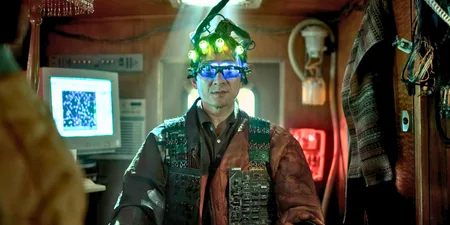Nothing at all has changed in Tambury, the fictional English town where After Life is set
He’s still sitting on the bench in the graveyard every day mourning his late wife, he’s definitely still hitting the bottle (after bottle after bottle) and he’s definitely still miserable as hell. Oh, and yes, Anti the German Shepherd is back.
Welcome back to life in Tambury, the fictional English town where Ricky Gervais’ widowed Tony character just about gets through his days. After Life season 3 arrives shortly on Netflix, marking the first time Gervais has made a third season of any of his shows. “The world’s too rich,” he told GQ of his decision behind writing and starring in a third season – historic for him and his die-hard fans.
What made Gervais decide this dark comedy about small town life deserved another go when even The Office didn’t make it past its second season? Perhaps that Netflix stats have proven it’s the most-watched British comedy of the decade?

Honestly, it’s kinda weird that we’re back here again as absolutely nothing happens throughout this entire series.
Tony is still struggling to move on with his life following the loss of his wife to cancer. His boss, Matt, played by Tom Basden, is still stuck in a life rut. His best mate and colleague Lenny, played by Tony Way, still lets the world wash over him. Emma the nurse, played by Ashley Jensen, has a new cohort of loveable old men with dementia to care for.
Jokes crowbar in controversial subjects like gender and identity but aren’t that funny
There are a handful of jokes that work, including one scene involving Tony blowing raspberries on a grown man’s belly button and a succulent being lobbed through a car window.
However a couple of others, including one about the sex of a snowman – should that be “snowperson?” – feel gratuitous and will re-ignite the debates that have spiralled for years around Gervais – comedy and offence.
If jokes are offensive shouldn’t they also be funny?
At times it feels as if Gervais is crow-barring in offensive jokes to feed the culture wars debate. One line about the snow person’s “massive penis” feels awkward and unfunny. Gervais often talks about how these jokes aren’t meant to offend minority communities, and that we can’t side step comedic moments in case we offend someone – but if jokes are offensive shouldn’t they be funny also?

Viewers that felt season 2 laboured similar points to season 1 may find themselves reaching for the remote. Or thinking back to the comic highs of The Office and Extras, which offered many more laughs.
After Life also uses cheap tricks to generate its emotion. Close-ups on Gervais’ face and the music being ramped up makes us know we should be sad. It sometimes works – but it’s hardly high art – but then again, maybe the fans don’t care.
“It’s how you actually feel when you lose someone,” a pal of mine told me recently when we discussed the return of the show. Perhaps that Tony hasn’t moved on, nor is he doing anything new, is the truest Gervais can be to the character, his feelings, and the die-hard After Life fans. Perhaps they aren’t here for the narrative arc but the relatable depiction of a man genuinely struggling to escape the pits of depression and addiction.
But that doesn’t justify why we’re in Tambury again, other than nostalgia. To give the record-breaking audience another hit. Gervais may love the richness of these characters, but the repetition of the storylines on this show mean it’s promptly heading towards its own after life.
After Life season 3 is now streaming on Netflix.
Related links:
- Ricky Gervais lobbies for ban on all animal experiments in the UK
- Ricky Gervais trolls the Oscars for not being invited to host
- Netflix’s new Ricky Gervais series is most Ricky Gervais thing imaginable






































